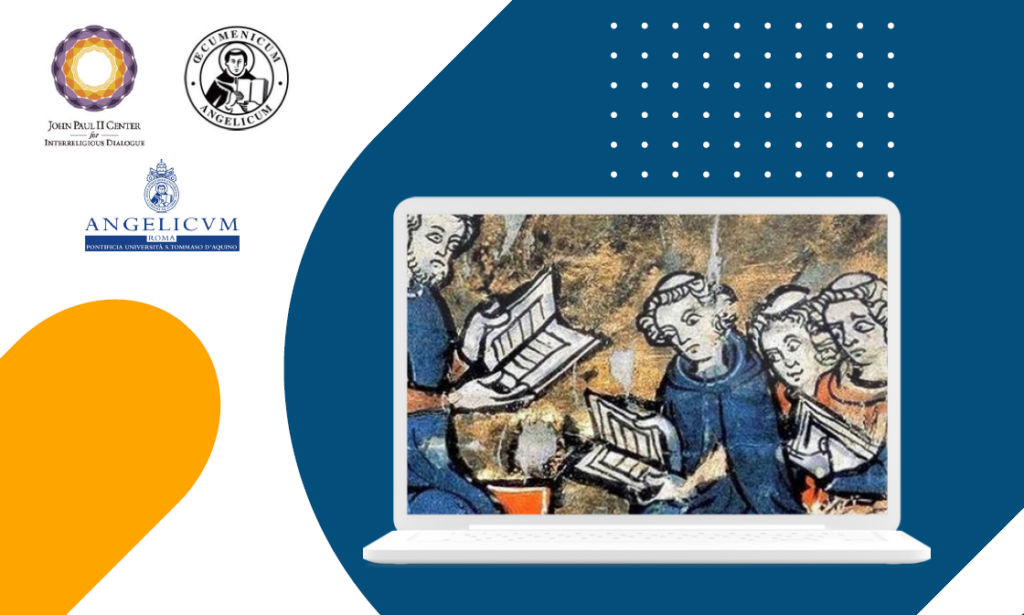Join us on April 10 at 5pm to discuss it
Deciding to put side by side Thomas Aquinas and Maimonides to discuss their contribution to Jewish-Catholic dialogue and what they can still teach us today is a challenge we are happy to take.
On April 10 and 11 a group of international scholars will gather for some closed-doors working sessions on “Aquinas on the Jews and Maimonides on the Christians: Reappropriating the Tradition for the modern period”. On April 10 you are all invited to join for a public conversation on the topic featuring Prof. Bruce Marshall, Lehman Professor of Christian Doctrine in the Perkins School of Theology at Southern Methodist University (Dallas, Texas, USA), and Prof. Menachem Lorberbaum, Professor of Jewish Philosophy at Tel Aviv University.
Preparing for that time together, we asked both speakers to share their starting point for the conversation.
The Declaration Nostra Aetate of the II Vatican Council was crucial to creating a new era for relations between the Church and the Jewish communities around the world. This however is only part of the story.
I find it as a Jewish theologian a model of introspection crucial to the very nature of the Church as a faith community and as such a paradigm for rethinking the course of my own responsibility for the course of our covenant with God.
Maimonides is in many ways a proponent of a triumphalist view of a politically committed theology but this again is only part of the story.
As a towering figure of religious authority he validates the path of human individuals who place themselves outside the polity or on its borders devoting their lives to worship. These become the scared of the sacred. I believe Maimonides here provides us with an eschatological vision placing a horizon of knowing God that opens a path for the healing potential of the path of devotion.
Prof. Menachem Lorberbaum
Menachem Lorberbaum is Professor of Jewish Philosophy at Tel Aviv University. He chaired the Graduate School of Philosophy and the Department of Jewish Philosophy at TAU (2004) and was the founding chair of the Department of Hebrew Culture Studies (2004-2008). Prof. Lorberbaum is also a founding member of the Shalom Hartman Institute,
Jerusalem where he headed the Bet Midrash program.
St. Thomas Aquinas is the most influential Christian thinker of the Middle Ages. His wide-ranging theological works devote extensive attention to the Jewish people, their election, their law, and their continuing role in the history of salvation. While Catholics today cannot accept the views of his time about the place of the Jews in a Christian society, his theological understanding of the Jews and Judaism raises fundamental issues that still need to be addressed, both within Catholic theology and in Catholic-Jewish dialogue.
Among these issues the most basic is how to understand God’s election of the Jewish people and its tie to the post-biblical practice of Judaism. Aquinas has a robust understanding of the election of Israel and of God’s faithfulness to his promises to the descendants of Abraham, Isaac, and Jacob—he is not, despite common stereotypes, a “supersessionist.” Following a long Christian tradition, he also holds that everything in Jewish scripture points in some fashion to Christ, whose coming has changed everything, and made the law given to Moses obsolete. Contemporary Jewish-Christian dialogue strongly affirms an understanding of Jewish election like that of Aquinas, but usually rejects any understanding of the Old Testament and of post-biblical Jewish practice like his. Is this a coherent position for Christians to hold, or does it mask a basic problem that Jewish – Christian dialogue has to face? Part of the value of reading Aquinas in dialogue with Maimonides is that he compels contemporary Christians to face that question.
Prof. Bruce Marshall
Bruce D. Marshall is Lehman Professor of Christian Doctrine in the Perkins School of Theology at Southern Methodist University (Dallas, Texas, USA), where he has taught since 2001. He has served as Randall Distinguished Professor in Christian Culture at Providence College, and is a past 248 president of the Academy of Catholic Theology. In 2023 he held the Aquinas Chair in the Thomistic Institute at the Angelicum in Rome.
Register here and join us for this conversation on April 10 at 5pm Rome time at the Aula Minor of the Pontifical University of St. Thomas Aquinas

